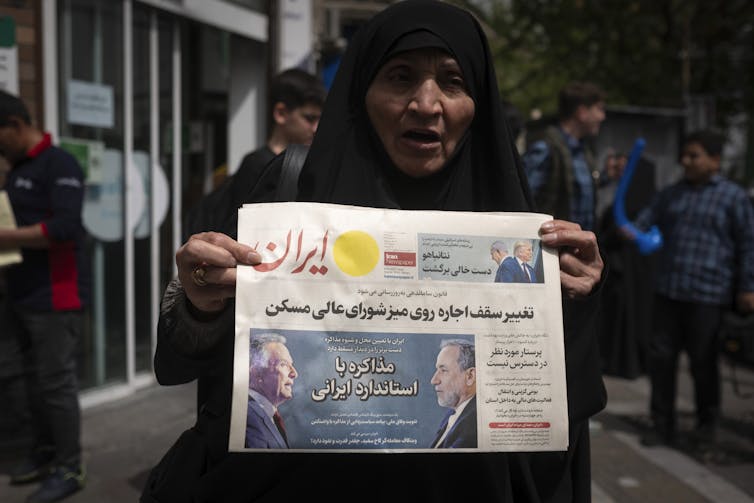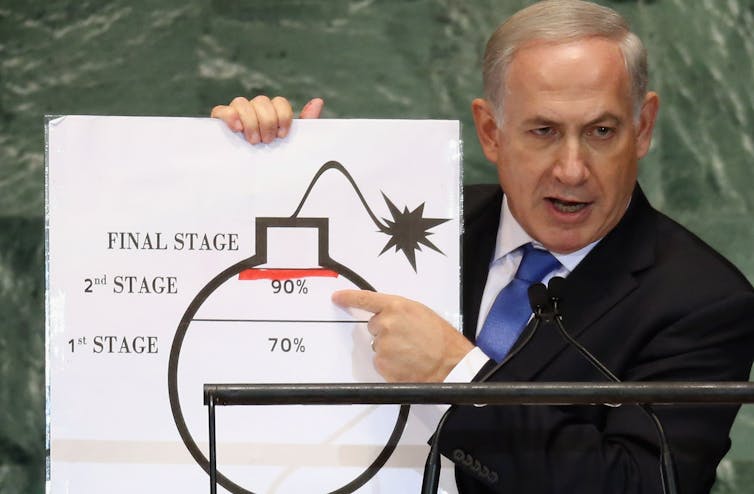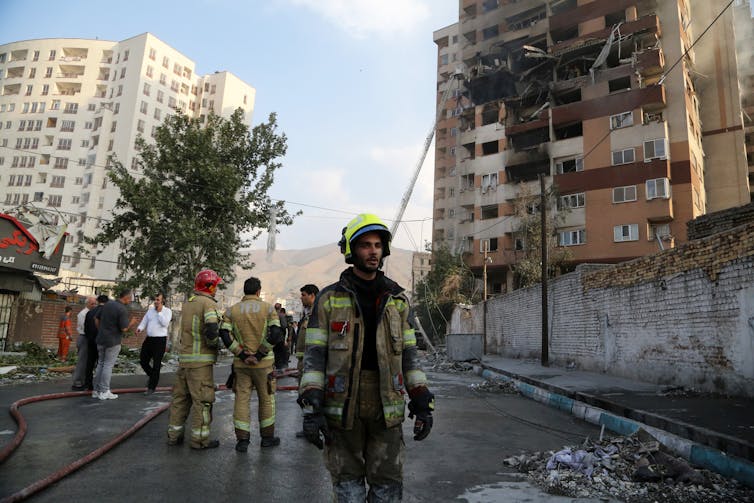Israel’s strike on Iranian nuclear and military facilities has pushed the Middle East one step closer to a far wider, more dangerous regional war. It also has implications for recent U.S. diplomatic efforts toward a deal with Tehran over its nuclear program.
Iran’s immediate response – the firing of about 100 drones into Israel, many of which were shot down – appears an opening gambit; meanwhile, Israeli Prime Minister Benjamin Netanyahu has said his country’s airstrikes would continue “for as many days as it takes.”
The Conversation turned to Javed Ali, an expert on Middle East affairs at the University of Michigan and a former senior official at the National Security Council during the first Trump administration, to talk through why Israel chose now to strike and what the implications are for U.S. policy on Iran.
Why did Israel strike now?
There was a combination of factors that led up to this moment.
One of the more immediate reasons was that an International Atomic Energy Agency report found that Iran was making progress toward enriching uranium to a degree that, in theory at least, would allow Tehran to very quickly upgrade to a weapons-grade level. That is the thrust of what Netanyahu has said by way of reason for the attack now – that intelligence shows that Iran was getting closer to a possible breakout status for a nuclear weapon.
But there is a confluence of other factors that have built up over the last year and a half, ever since the Oct. 7, 2023, attack by Hamas in Israel.
Iran’s proxy Axis of Resistance – that is, regional groups aligned with Iran and supported militarily by Tehran, including Hamas and Hezbollah – doesn’t present the same level of threat to Israel as it did in the pre-Oct. 7 landscape.
In the past, an Israeli attack of the sort we are seeing now would have invited a multidirectional response from all corners of the resistance – and we saw this in the early days after the Oct. 7 attack.
As of now, none of Iran’s resistance partners have done anything in response to the latest strike – and that is, in large part, due to the fact that Israel has successfully degraded these group’s capabilities through a series of campaigns and operations. The United States has also contributed to this effort to a degree with sustained operations against the Houthis in Yemen from March to May this year, including hundreds of airstrikes.
Further, Israel’s previous attacks on Iran in April and October 2024 managed to degrade Iran’s ballistic and surface-to-air missiles and air defense radar systems. This likely played into Israel’s calculations, too.
Lastly, Israel knows that it has a strong supporter in the White House with President Donald Trump and Republicans in Congress. Washington may not be 100% aligned with Tel Aviv on every issue, but at the moment there is no criticism from the the White House or Republican members of Congress on Israel’s attacks.
But why attack before the planned US-Iran talks?
The sixth round of talks was due to take place on June 15, led by White House envoy Steve Witkoff and Iranian Foreign Minister Abbas Araghchi. Iran has signaled that the talks won’t take place now.
There may have been some dialogue between Netanyahu and the Trump administration over the timing of the Israeli strike preceding yesterday’s attacks, during which Israel would have made the case that the time is right now to launch a very different type of campaign to really set back Iran’s nuclear program. In recorded remarks about Israel’s operations, Netanyahu stated he directed his national security team to begin planning for a large-scale campaign against Iran’s nuclear program last November.
Perhaps the White House did push back, saying that it wanted to see if any progress could be made in the talks. Certainly, it has been reported that Trump told Netanyahu in a phone call on June 10 that he believed a deal with Tehran could be negotiated.
Regardless, Netanyahu still went ahead with the strike.
Indeed some observers have posited that collapsing the negotiations between the U.S. and Iran may have been one of the intentions of Netanyahu, who has long opposed any deal with Tehran and has reportedly been irked by Trump’s reversal on the issue. During his first administration, Trump unilaterally pulled the U.S. out of a previous nuclear deal.

What should we make of the US response to the strike?
The White House hasn’t criticized Israel in its response to the strike, merely stating that it wasn’t involved.
In my assessment, the White House appears to be sincere in the substance of what it is saying: that there was no overt and direct U.S. involvement with Israel during the actual strike. As for U.S. involvement in any planning or intelligence sharing ahead of the strike, we may never know.
But this is largely messaging for Iran: “We didn’t attack you. Israel attacked you.”
The U.S. is clearly worried that any response in Tehran may involve U.S. assets in the region. In the past, parts of Iran’s proxy network have hit American bases in Jordan and Iraq. Backing up this being a real concern in Washington is the fact that in advance of Israel’s strike, it already made moves to protect some of its assets in the region and remove personnel.
Has Iran said whether US targets will be included in its response?
On June 11, Iranian Defense Minister Aziz Nasrizadeh warned that if Israel were to attack, Tehran would respond against U.S. personnel and bases in the region – but that hasn’t happened yet.
Iranian Supreme Leader Ali Khamenei and military officials must know that attacking U.S. targets would be very risky and would lead to a significant response that would likely be even more damaging than Israel’s latest attacks – including putting a potential deal over its nuclear program at risk. And the U.S. has the capability to hit Iran even harder than Israel, both militarily and through the extension of sanctions that have already been very punishing to the Iranian economy.

Ultimately, it will be Khamenei who decides Iran’s response – and he remains firmly in control of Iran’s national security apparatus despite his advanced age. He knows he will have to walk a fine line to avoid drawing the U.S. into a military campaign.
So how might Iran respond in coming weeks?
Despite the challenges facing Iran at the moment, Iran will, I believe, have to respond in a way that goes beyond its previous attacks on Israel.
Reports of drone attacks against Israel on June 13 fit within the framework of the attack Iran launched against Israel in April 2024 that included a combined salvo of almost 300 ballistic missiles, cruise missiles and drones over several hours. Despite the damage Israel has inflicted against Iran through its series of operations, Iran probably still possesses thousands or tens of thousands of these types of weapons that it can use against various targets in the region.
Iran could look at targets outside Israel, without necessarily hitting the U.S. directly – for example, by attacking maritime targets in the Persian Gulf and in effect closing the Strait of Hormuz. U.S. military planners have long been concerned about Iranian naval attacks using small boats for ramming or small arms attacks against shipping in the Persian Gulf.
Another option would be for Iran to increase its involvement in terrorism activities in the region. Tehran’s proxy groups may be diminished, but Iran still has its Quds Force, through which the Islamic Revolutionary Guard Corps conducts nonstate and unconventional warfare. Will the Quds Force look toward targeted assassinations, bombings, or kidnappings as part of Iran’s retaliatory options? It has employed such tactics in the past.
And beyond conventional weapons, Iran also has pretty significant cyber capabilities that it has used against Israel, the United States and Saudi Arabia, among others.

Where does this leave US-Iran talks?
It would appear Trump is still holding open the possibility of some kind of deal with Iran. In his statement following the Israel attack, he warned Tehran that if it didn’t come back to the table and cut a deal, the next Israeli attack would be “even more brutal.”
The attack could push Iran into reengaging in talks that were seemingly stalling in recent weeks. Certainly that seems to be the thrust of Trump’s messaging.
But the killing of Iranian nuclear scientists in the attack, and the apparent wounding of one of the negotiators, may convince Tehran to double down on a path toward a nuclear weapon as the only means of a deterrence against Israel, especially if it suspects U.S. involvement.

 German (DE)
German (DE)  English (US)
English (US)  Spanish (ES)
Spanish (ES)  French (FR)
French (FR)  Hindi (IN)
Hindi (IN)  Italian (IT)
Italian (IT)  Russian (RU)
Russian (RU)  3 weeks ago
3 weeks ago
























Comments